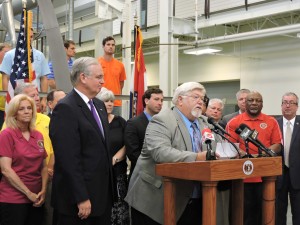Southwest Missouri Democrats plan a second town hall meeting to support Gov. Jay Nixon’s veto of right-to-work legislation.
Teresa Henry, a Democrat candidate for attorney general, will be the featured speaker at the event set for 6:30 p.m. Wednesday, August 26 at the IBEW Hall, 3316 S. Main St., Joplin, MO. 64804.
Groups for and against the measure are gearing up in advance of the veto session that starts Sept. 16 in Jefferson City.
Read more from The Joplin Globe.
Tag: right-to-work

Due to the Republican Party’s lock on midterm elections, this year marks the first time that anti-worker groups were able to foster enough support in the state Legislature to send a bill to the Governor. The Legislature effectively shut down the last week of it’s session after some GOP senators forced a vote on the measure.
Even with an overwhelming and record number of Republicans in the Missouri House and Senate, the bill’s original passage still fell short of the two-thirds majority vote needed in both chambers to overturn Governor Nixon’s veto. The Republican Party was split, with many members joining Democrats in opposition to the extreme legislation.
To override the veto, the Republican-controlled Legislature would need 23 votes in the Senate and 109 in the House. The Senate passed the measure 21-13 earlier this year while the House passed it 92-66.

Menges
Transportation Division Missouri State Legislative Director Ken Menges asks members for their support. Next week is the final week of the 2015 legislative session and the senate is planning to debate the state’s “right to work” anti-labor bill.
“We are being asked by the Mo. AFL-CIO to ‘pack’ the gallery of the senate next week. If any SMART member could spend a few hours in Jefferson City next week at the Capitol it would be greatly appreciated,” Menges said. “I know that our schedules are hectic, but a few hours any day would be a great help.”
Mo. AFL-CIO President Michael Louis said, “We are faced with the worst attack on labor and working families ever. Right to work has passed the house and now awaits floor debate to pass the senate. We must all unite to stop this unfair and unnecessary attack.
“Everyday next week, Monday through Friday, there is a very good chance that right to work will be on the senate floor. With one stroke of the pen all of the working conditions, wages and fringe benefits that have been fought for decades can be taken away from Missouri workers.”
Members planning to fill the senate gallery should call the Mo. AFL-CIO at (573) 634-2115 so that they can create a schedule to spread out the crowds over the course of the week. Monday’s session begins at 11 a.m. and 8:30 a.m. the rest of the week. Members can also call the Mo. state legislative board at (573) 634-3303 for further assistance.

Menges is asking SMART members in the state to contact their state representatives and ask them to vote against the legislation.
“These so called ‘right to work’ or ‘workplace freedom’ bills aren’t what they seem,” Menges said. “This type of legislation and other divisive laws will financially harm working class Missourians and make our workplaces less safe.”
SMART members and their family members can contact their state representative by visiting the “Find My Legislator” webpage on the Missouri House of Representatives webpage.
After entering their ZIP code, citizens can find the state representative. Click on the legislator’s name to reach his or her contact page containing the legislator’s office telephone number and Email address.
Let you representative or his or her staff know that you are “strongly opposed” to House Bill 582 and HCS House Bill 116.
Today’s legislative session begins at 10 a.m.
The Missouri House of Representatives plans to vote on right-to-work legislation today, April 2.
State Legislative Director Ken Menges, asks that all Missourians call their state representatives today and tell them to vote no on right-to-work.
“Tell your Representative that these laws being pushed by out-of-state corporate CEOs are bad for Missouri’s working families: they’ll lower wages and benefits at a time when the middle class is already struggling,” Menges said.
Click here to learn more on how to contact your Missouri legislators.

The measure — which, as Roll Call reported Nov. 4, would be tacked onto the Employment Non-Discrimination Act (ENDA) — would forbid contracts between companies and labor unions that require workers to pay the union for bargaining on their behalf. Prized by Republicans and business groups and loathed by unions, such laws have made it onto the books in 24 states, most recently in Michigan.
Read the complete story at The Huffington Post.
HAMMOND, Ind. – A Lake County Superior Court judge has ruled Indiana’s right-to-work law unconstitutional, but the decision doesn’t mark the end of a legal battle over the measure.
Judge John Sedia ruled the law unconstitutional last week because the state constitution calls for just compensation for services, according to an order. The ruling stems from a lawsuit filed in February 2013 on behalf of members of the International Union of Operating Engineers Local 150 AFL-CIO, who argued the law violated the constitution.
Read the complete story at The Times of Northwest Indiana.
05/02/13 UPDATE: Ohio right-to-work bills were considered “dead-on-arrival” as Senate Republic President Keith Faber rejected the bills last night in an after-hours press conference.
“We have an ambitious agenda focused on job creation and economic recovery, and Right to Work legislation is not on that list. After discussions with other leaders and my caucus, I don’t believe there is current support for this issue in the General Assembly,” Faber said. “The only purpose this discussion serves right now is to generate a bunch of breathless fundraising appeals from the Ohio Democratic Party.”
Original Story:
Ohio has joined Pa. and Mo. in the fight against right-to-work bills. Today, two Republican Ohio Representatives Kristina Roegner and Ron Maag submitted bills seeking to take away rights from unions and their members in Ohio.
Roegner’s bill goes after private-sector unions such as UTU-SMART while Maag’s bill focuses on unions of the public sector.
Ohioans are clearly against this type of legislation with 60 percent of Ohio voters having voted down similar legislation in Senate Bill 5 (SB 5) that was introduced in 2011. SB 5 almost cost Ohio Republican Governor John Kasich his job when he sought to make SB 5 law without allowing Ohioans to vote on it. Petitions and outcries were heard loud and clear in Ohio’s government and SB 5 went to the people to be voted on in November 2011 and was voted down.
Ohioans are still working on getting an amendment passed that would allow the people of Ohio to vote to remove a governor from office as a result of the SB 5 fiasco.
Kasich has refused to support any right-to-work bill since SB 5 failed and has instead remained focused on other legislation. Kasich has yet to weigh in on the new legislation that was introduced today.
Pennsylvania and Missouri are also facing similar bills in their respective Houses. Recently, the state of Maine rejected right-to-work bills in both the state House and Senate, effectively killing those bills.

Ten different unions marched in downtown Chambersburg, Pa., in protest of the bill over the weekend. If passed, the bills would allow non-union members the same benefits that dues-paying members receive, such as higher wages and benefits and union representation.
House Bill 50, sponsored by Rep. Daryl Metcalfe, seeks to end union membership or dues payment by non-members as a condition of employment.
House Bill 51, sponsored by Rep. Kathy Rapp, seeks to prohibit unions from collecting dues from non-union public school employees.
House Bill 52, sponsored by Rep. Fred Keller, would prohibit unions from collecting dues from non-union state employees.
House Bill 53, sponsored by Rep. Jim Cox, seeks to prohibit unions from collecting dues from non-union local government employees. Rep. Stephen Bloom is also proposing House Bill 250, that would repeal a state law known as “maintenance of membership.” The bill would essentially allow dissatisfied union members to quit their union at any time, as opposed to a current 15-day window toward the end of contracts. Rep. Jerry Knowles also seeks to pass an umbrella bill that would prevent union membership from being a condition of employment in the private sector.
Metcalfe has introduced this union-busting legislation in every session over the past 14 years. This year is viewed as different, because Republicans control both the House and Senate of the Pennsylvania Legislature, as well as the governor’s seat.
Legislators in favor of the bill hope to introduce it to the House speaker soon.
With the adjournment of the 2012 Minnesota legislative session, the Minnesota AFL-CIO, along with the UTU and other AFL-CIO member organizations, has succeeded in defending against right-to-work (for less) legislation introduced by Tea Party Republicans.
“The AFL-CIO lobbying team held every Democratic Farm Labor Party legislator in support of a Working Family Agenda that included defeat of the right-to-work (for less) legislation by convincing a core block of moderate and veteran Republicans to vote against the bill,” said UTU Minnesota State Legislative Director Phil Qualy.
Additionally, said Qualy, “despite Republican control of both chambers in the state legislature, for the first time in 38 years, none of our state safety statutes has been harmed during the legislative session now ended.”
Qualy commended UTU Locals 911, 1000 and 1067, which hosted Minnesota AFL-CIO training sessions on the law, which would have weakened collective bargaining rights.
“Also to be commended are UTU members and retirees who called their legislators and made the difference when the Republican leadership heard loud and clear from main street and good middle class Americans,” Qualy said.
